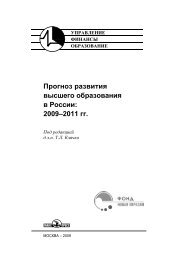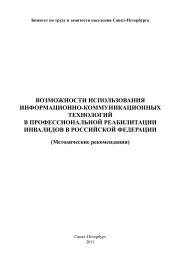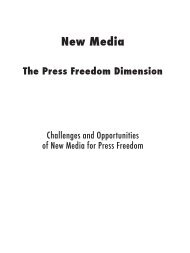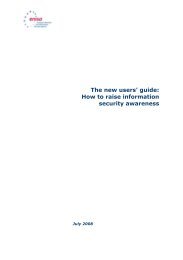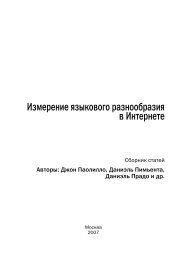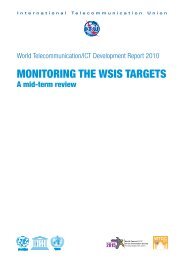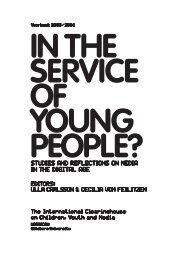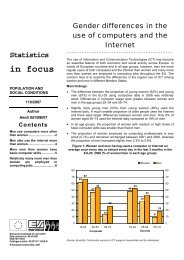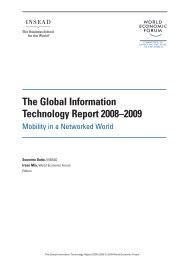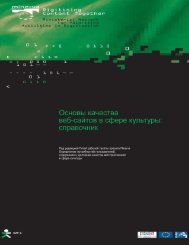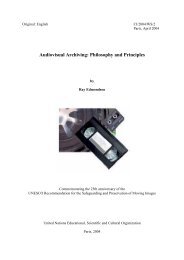Creative Economy: A Feasible Development Option
Creative Economy: A Feasible Development Option
Creative Economy: A Feasible Development Option
- No tags were found...
Create successful ePaper yourself
Turn your PDF publications into a flip-book with our unique Google optimized e-Paper software.
9The international dimension of creative-industries policymeets annually in Geneva. This has paved the way for partnershipsand prompted a new impetus for collaborative initiatives,taking into account the competencies, mandates anddifferentiated approaches of the bodies involved. A concreteexample of such initiatives was the <strong>Creative</strong> <strong>Economy</strong> Report2008, a joint endeavour by five United Nations agencies toimprove policy coherence and the impact of internationalaction on issues relating to the creative economy.9.2.4 UNCTAD XII: From the creativeindustries to the creative economyA High-level Panel on <strong>Creative</strong> <strong>Economy</strong> andIndustries for <strong>Development</strong> met on 14-15 January 2008 inGeneva as an UNCTAD XII pre-conference event. The sessionwas attended by eminent government officials, policymakers,experts and practitioners from the cultural andcreative community and academia. They represented 49 countries,19 international organizations and 9 non-governmentalorganizations. The panel was convened by the Secretary-General of UNCTAD with the aim of assisting MemberStates in their deliberations on this topic at UNCTAD XII. 11The session had three specific objectives: (a) to provide a platformfor progress in the intergovernmental debate in the areaof the creative industries and the emerging creative economy;(b) to review the work undertaken by the UNCTAD secretariatin fulfilling its mandate on this innovative topic, reassertits role and identify areas for possible future work; and (c) totake stock of progress made on the analytical and policyagenda surrounding the creative economy. It was recognizedthat, in line with its mandate (São Paulo Consensus, paragraphs65 and 91), UNCTAD has been playing a key role insensitizing governments to the potential of the creative economyto foster trade and development gains, promoting policyorientedinitiatives and enhancing cooperation with countries,institutions and the international community at large. 12The panel discussed policy strategies, multilateralprocesses, national experiences, assessment tools, and areasfor international cooperation aiming at enhancing creativecapacities in developing countries. It also recognized thatUNCTAD’s work in the area of the creative economy andthe creative industries should be pursued and enhanced.Participants expressed support for UNCTAD to strengthensynergies with the United Nations agencies, in particularwith the UNDP Special Unit for South-South Cooperation,UNESCO, WIPO and ITC. UNCTAD should continue tofulfil its mandates and assist governments on issues related tothe development dimension of the creative economy, in linewith the three pillars of its work: (a) consensus-building, byproviding a platform for intergovernmental debates; (b) policy-orientedanalysis, by identifying key issues underlying thecreative economy and the dynamics of creative industries inworld markets; and (c) technical cooperation, by assistingdeveloping countries to enhance their creative economies fortrade and development gains.Furthermore, two other important events were heldduring the twelfth session of the quadrennial MinisterialConference of UNCTAD held in Accra, Ghana, from 20 to25 April 2008: (a) the launching of the <strong>Creative</strong> <strong>Economy</strong>Report 2008 13 by the Partnership between UNCTAD and theUNDP Special Unit for South-South Cooperation as thefirst multi-agency study to present the United Nations perspectiveon this emerging topic; and (b) the launching of theUNCTAD <strong>Creative</strong> Africa Initiative. 14 <strong>Creative</strong> Africa wasan initiative put forward by the UNCTAD secretariat with aview to bringing greater pragmatism to the policy debates.The aim was to showcase the diversity of African culture andthe vigour of African creative industries through a series ofcultural events held during the conference. <strong>Creative</strong> Africamarked the starting point of a strategy to strengthen the creativeeconomy so as to foster development in Africa. Theevents spotlighted the continent’s visual arts, music, dance,film and fashion. The initiative was articulated as a tool forpromoting government and business interests and to open upnew avenues to effective international cooperation. The<strong>Creative</strong> Africa concept is based on ownership and partnershipsinvolving all stakeholders. Famous African artists performedthrough music, poetry, dance, film, and fashion aswell as arts crafts exhibition. Moreover, two seminars provideda forum for free open dialogues to shape business, investments,partnerships and international cooperation throughaction-oriented initiatives. As a follow-up, UNCTAD wasinvited to address a meeting convened by the EU Parliamentin Brussels in March 2009, gathering around 60Ambassadors and Parliamentarians from the EuropeanUnion and Africa, as well as the Director General for11 UNCTAD (2008). For further details about the meeting, consult: http://www.unctad.org/Templates/Meeting.asp?intItemID=1942&lang=1&m=14639&year=2008&month=1.12 Ibid.13 http://www.unctadxii.org/en/Programme/Other-Events/<strong>Creative</strong>-Africa/Launch-of-the-<strong>Creative</strong>-<strong>Economy</strong>-Report/.14 http://www.unctadxii.org/en/Programme/Other-Events/<strong>Creative</strong>-Africa/.234 CREATIVE ECONOMY REPORT 2010



